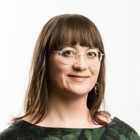Towards listening and learning
My first concrete contact with the EFC occurred six years ago when I attended their Annual Conference and General Assembly in Copenhagen in 2013. At that point, I had been working at Kone Foundation for several years, first as a Scientific Secretary and for a year as Head of Cultural Affairs. As the international foundation field was new to me, I decided to apply for the EFC’s Next Generation Programme. I am very happy that I did: The Next Gen group helped me navigate new circles among several hundred conference attendees. (Special thanks to Lucia Patuzzi and Wendy Richardson, who back then coordinated the Next Gen activities!)
While considering working in the sector, one of the most important lessons came from the conference in Copenhagen. The message was nothing new, but it was very important to hear this from highly experienced foundation professionals who had been working in the field for decades – and to hear them say this also in very serious manner. The message for us Next Gens in the sector was: Remember how privileged you are.
In 2014 I had the chance to take part in the Summer Academy in Rotterdam, organised jointly by the EFC and the Erasmus Centre for Strategic Philanthropy. With my colleague, Director of Research Funding Kalle Korhonen, we had a lot to bring home. One of the themes addressed was donor-grantee relations, critical when thinking about the work of grantmaking foundations such as ours. There is a strong connection between that relationship and privileges, too.
Charles Keidan (now Editor of Alliance Magazine) who guided us through these themes, talked about the different worlds that the donor and grantee live in − worlds ranging from abundance and richness to ones of scarce resources. In our case, this means the low-income of our grantees, i.e., artists and art organisations, and academics, too, compared to a wealthy foundation. It also describes the different situation we foundation staff have: a quite safe and fairly paid job, especially compared to many academics and artists facing short-term contracts and insecure futures.
In Rotterdam, we were also introduced to the seven deadly sins of philanthropy (Orosz, 2011), the first of which I remember very well − believing in flattery. Of course, it is great to hear about the good work we are doing. But while I don’t think people are only flattering, I don’t think they are lying either. However, getting honest feedback from grantees can be difficult: That’s a fact not to be dismissed. Critical feedback is required to be able to develop our work and understand the needs of our grantees and the field as well. We at the foundation have ample experience acquiring critical feedback, both through anonymous surveys and by organising workshops for grantees (where our staff are not present).
Insights gained from the Summer Academy encouraged us to begin building a community in a more systematic way and help our grantees to network. We also started thinking of diverse possibilities for added value: What else we could offer our grantees beyond financial support? Since then, we have been, little by little, building the Kone Foundation’s Grants+ Programme in which we offer work space, advice and consultation; help in building networks; and different kinds of capacity-building, from communications support to understanding the nature of creative work. This is also helping us to increase the impact of work done by our grantees. And most important, through the Grants+ Programme, we get to know our grantees and their needs to better develop our work and support their field.
The Grants+ Programme offers possibilities for peer learning and is a natural means for using the incredibly important assets of the foundation, i.e., hundreds of bold artists, academics and other creative professionals who can support each other and create new relationships and cooperation and enrich this planet with their work. It is not only the grantees who profit from this − we benefit, too.
A question our grantees have brought up lately is, “How can we move more towards partnerships?” This we considered, among other things, together with art organisations and other funders at the Towards Smart Art Funding event this year. The balance between long-term partnering, while welcoming both newcomers, and experimental initiatives seems to be eternal and shared with many funders across the world.
To get back to the theme of the privileges and asymmetry of power: “How can one build collaborative relationships based on mutual trust when the power relations are unbalanced, as is usually the situation among donors and grantees?” Being aware of and acknowledging our privileges is necessary. Even the long-term nature of foundations doesn’t mean never-ending grants, but at our foundation we’ve decided to move towards grants spanning several years and permanence with, for example, our new premises at Lauttasaari Manor in Helsinki, where we also offer new possibilities for our grantees to network and organise events, for example.
Our new premises and the Grants+ Programme also present us with the possibility to listen – listening being one of the most important skills, both now and in the future, in order to be more inclusive and wiser. That is definitely something we hope to learn as an EFC member.
Authors

Executive Director, Kone Foundation